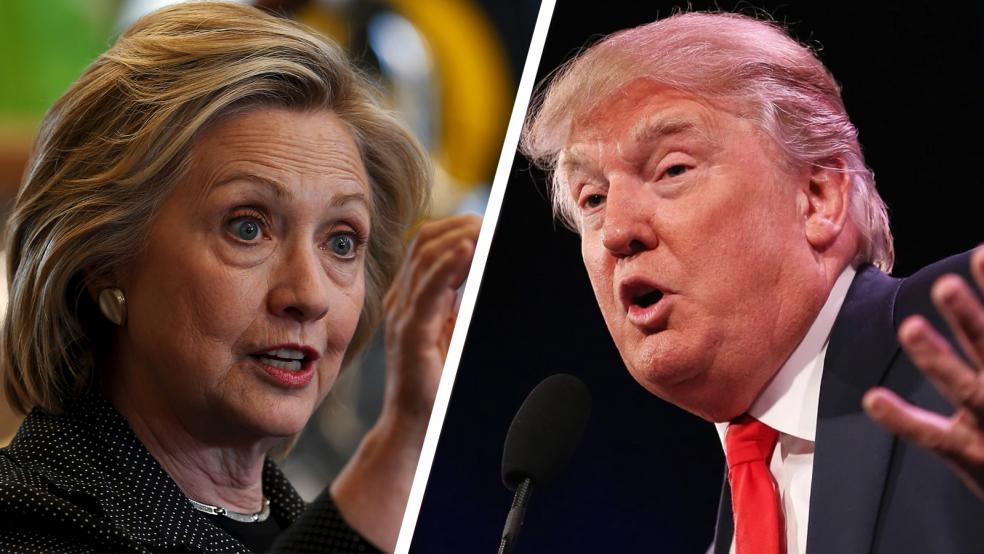In 1991, Louisiana voters faced a difficult choice. In the runoff gubernatorial election that fall, the candidates were Democrat Edwin Edwards and Republican David Duke. The notoriously corrupt Edwards had already served three terms as governor and faced bribery charges. (When it turned out, after Edwards was acquitted in that case, that some of the sequestered jurors had stolen towels from their hotel, Edwards reportedly quipped that he had been judged by a “jury of my peers.”) Edwards would later be convicted on 17 counts of racketeering, extortion, money laundering and fraud.
Duke’s story was even worse; he was a former Grand Wizard of the Ku Klux Klan and was still active in white supremacist circles. Mainstream Republicans lined up behind Edwards. In the heat of the campaign, which Edwards went on to win, it became common to see bumper stickers that read, “Vote for the Crook. It’s Important.”
Maybe somebody should print up another batch of those stickers for the presidential race this year. With Hillary Clinton assured of surpassing the 2383 delegate nomination threshold today, Democrats have chosen an apparently corrupt candidate to be their presumptive nominee. She’s still the better choice for president.
Related: How Conservatives Stopped Listening and Lost Control of the GOP
Circumstantial evidence of Clinton’s corruption is abundant and easily found by anyone not in denial. Although she is not responsible for her husband’s infidelity nor for Vince Foster’s suicide, other scandals are not so easily dismissed. As the recent State Department Investigator General’s report suggests, Clinton set up a home brew email server in contravention of department policies to prevent disclosure of her correspondence. The IG report also confirms that, even today, Clinton has not turned over all the messages that passed through her personal server.
Some of the missing messages may have documented the inappropriate links between her job as secretary of state and her involvement with the Clinton Foundation. As documented by Peter Schweizer in Clinton Cash, State Department project approvals sometimes coincided with large contributions to the foundation by beneficiaries of these actions. After leaving office, Clinton continued to sell her influence to the highest bidder, as evidenced by the $225,000 speaking fees she received from Goldman Sachs.
Clinton’s pay-for-play activity has a long history — going back at least to the late 1970s. As I previously wrote, Clinton effectively received a $98,000 bribe from interests related to Tyson Foods via a sham futures trading account. Her husband’s Arkansas gubernatorial administration then eased oversight of Tyson, allowing it to contaminate one town’s water supply with chicken manure.\
Related: Most Americans Don’t Believe Hillary Clinton and Donald Trump
In 1992, the cozy relationship between Bill Clinton’s Arkansas state house, Hillary’s Rose Law Firm and regulated entities was detailed by The Washington Post and raised by former California Gov. Jerry Brown during a presidential debate. Under Bill Clinton’s administration, Arkansas issued multiple no-bid contracts to the Rose Law Firm, assigned it up $175,000 in bond counsel work and authorized Madison Guaranty Bank — a failing Savings and Loan Association represented by Hillary — to issue preferred stock.
When political leaders fail to play by the rules applied to normal people, a natural reaction is to try and stop them. But, in this case, stopping Hillary Clinton means supporting someone else for president. And for those who think voting for a third party candidate is a waste, that leaves only one alternative: Donald Trump.
So rather than immediately dismissing Hillary for her ethical flaws, the correct approach is to determine whether she is better than the alternative. I tend to think the answer is yes.
A useful way to look at the decision this November is to ask whether continuity or change is the better option for the U.S. at this point in time. Clinton is likely to continue most Obama-era policies, whereas Trump can be expected to attempt some radical departures.
Related: Can Trump’s Nationalist Trade Policy Really Make America Great Again?
Complaints about the status quo notwithstanding, life in 2016 America isn’t horrible for most of us, and so radical change comes with a lot of downside risk. Although some of the doom and gloom predictions about a Trump administration are overstated (for example, I would not expect white supremacists to play a major role in his administration), there are legitimate causes for concern.
A major threat posed by Trump is the potential for a breakdown in global cooperation. Trump seems to view foreign countries like competing companies or candidates, failing to appreciate the interdependence that characterizes our global order. Trumpian brinkmanship could trigger a global trade war, repeating the error of the 1930 Smoot-Hawley Tariff. When Herbert Hoover signed that piece of protectionist legislation, the result was a cascade of beggar thy neighbor reactions from U.S. trading partners, greatly exacerbating the Great Depression.
Trump’s policies toward illegal immigrants would also be destabilizing. Millions of undocumented aliens take service and agricultural jobs that American citizens avoid. If these individuals are rounded up or “self deport” in large numbers, industries that rely on them could be crippled. Alternatively, as last week’s violence in San Jose portends, a Trump presidency is likely to produce more civil disorder.
Related: Here's Why Establishment Republicans Are Getting Behind Trump
None of this would be a concern under a Clinton administration. But can we tolerate an apparently corrupt president? We don’t have to go back too far in American history to answer that question in the affirmative. During the late 1990s, while Bill Clinton was “renting out” the White House Lincoln Bedroom to major donors and being impeached for lying to a grand jury, the United States enjoyed an economic boom, widely shared prosperity and a balanced federal budget.
More generally, researchers have found that corruption and economic growth often go together. An administration of honest, anti-business true believers may reject projects that create social benefits because they over-emphasize environmental, anti-trust or fairness concerns. By contrast, a government that can be bought will likely authorize more projects and business combinations that promote growth. Admittedly, some of the business activities approved by paid-off officials will be negative on net; it may be hard to tell whether the benefits from the good initiatives will exceed the harm from the bad ones.
Mark Cuban: Here's Why Trump Would Be a Puppet President
A new Clinton administration facing a Republican House of Representatives and closely divided Senate probably won’t accomplish much in 2017 and 2018. Major legislation, like the Affordable Care Act, is unlikely to advance through Congress. Further, the House can use its powers of investigation to either rein in administration abuses or at least subject them to negative publicity.
A continuation of the gridlock of recent years punctuated by 1990s-style scandals is certainly not an ideal environment, but it is one we can tolerate. Given the risks posed by the alternative, a vote for “crooked Hillary” this November may be the better choice, even for Conservatives.






